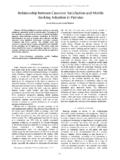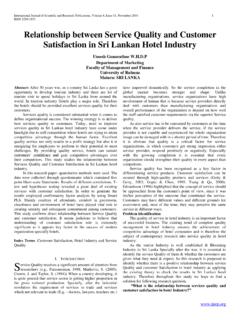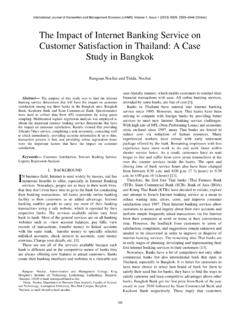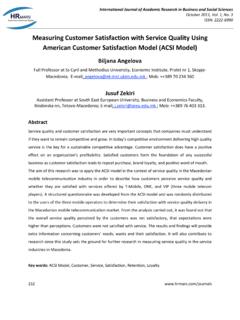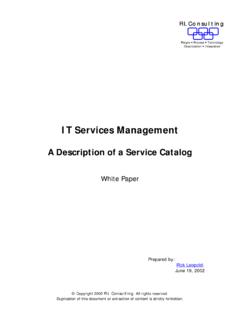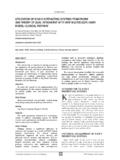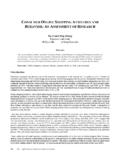Transcription of Financial Information Unit Guide to Money …
1 1 FFiinnaanncciiaall IInnffoorrmmaattiioonn UUnniitt GGuuiiddee ttoo MMoonneeyy LLaauunnddeerriinngg aanndd TTeerrrroorriisstt FFiinnaanncciinngg SSuussppiicciioouuss TTrraannssaaccttiioonn RReeppoorrttiinngg Preamble: This guidance is issued to assist Financial institutions, designated non- Financial businesses and professions (DNFBP s) and non-profit organizations ( reporting Entities ) to meet their reporting obligations under Law No. (4) Of Year 2010 on Anti- Money Laundering and Combating the financing of Terrorism (AML/CFT Law). This will in turn contribute to ensuring Qatar continues to meet its ongoing commitment to international standards, including the FATF 40+9 Recommendations and contributes positively to the international fight against Money laundering and terrorist financing .
2 suspicious transaction reports play a crucial role in the fight against Money laundering and terrorist financing and the Financial Information Unit (FIU) is committed to ensuring that reporting Entities in Qatar file suspicious transaction reports of the highest quality. 2 reporting Entities obligations under the AML/CFT Law Who is required to report ML/FT suspicious transactions ? Pursuant to Article (18) of law no (4) of 2010, The AML/CFT Law requires that suspicious transaction reports (STRs) must be made to the FIU by reporting Entities where they have a suspicion or reasonable grounds for suspicion of Money laundering or terrorist financing . For the purposes of Article (18) of the Law, reporting Entities include: Financial Institutions Any person or entity who conducts as a business one or more of the following activities or operations for or on behalf of a customer: (1) Accepting deposits and other repayable funds such as private banking services.
3 (2) Lending. (3) Financial leasing. (4) Transferring Money or things of value. (5) Issuing or managing means of payment, such as credit and debit cards, cheques, traveller s cheques, Money orders, banker s drafts and electronic Money . (6) Financial guarantees and commitments. (7) Trading in Money market instruments, such as cheques, bills, certificates of deposit and derivatives, foreign exchange, exchange instruments, interest, rate, index instruments, transferable securities, and commodity futures trading. (8) Participating in securities issues and providing Financial services related to securities issues. (9) Undertaking individual or collective portfolio management. (10) Safekeeping or administering cash or liquid securities on behalf of other persons. (11) Investing, administering or managing funds or Money on behalf of other persons.
4 (12) Underwriting or placing life insurance and other investment-related insurance, whether as insurer or insurance contract intermediary. (13) Money or currency changing. Designated Non- Financial Businesses and Professions (DNFBPs) (1) Real estate agents, if they act in transactions for clients in relation to buying or selling of real estate, or both. (2) dealers in precious metals or stones, if they engage with their customers in cash transactions equal to a minimum of 55,000 Rials. (3) lawyers, notaries, other independent legal professionals, or accountants, whether sole practitioners, partners or employed specialists in specialist firms, if they prepare, execute, or conduct transactions for clients in relation to any of the following activities: 3 (a) buying or selling real estate.
5 (b) managing client Money , securities or other assets. (c) managing bank, savings accounts or other securities accounts. (d) organising contributions for the creation, operation or management of companies or other entities. (e) creating, operating or managing legal persons or legal arrangements. (f) buying or selling business entities. (4) Trust and Company Service Providers, and other company service providers, if they prepare, or conduct transactions for clients on a commercial basis in relation to: a) acting as a formation agent of legal persons. b) acting as, or arranging for another person to act as, a director or secretary of a company, a partner of a partnership, or a similar position in relation to other legal persons. c) providing a registered office, a business address, or a correspondence address or an administrative address, for one of the companies, partnerships or any other legal person or legal arrangement.
6 D) acting as, or arranging for another person to act as, a trustee of an express trust. e) acting as, or arranging for another person to act as, a nominee shareholder for another person. Non-Profit Organisations (NPO s) Any organization or association which collects, or disposes of funds for charitable, religious, cultural, educational, social, or fraternal purposes, or to do any other kind of charitable activities. Lawyers, Notaries and other Independent Legal Professional Under Article (18) of the AML/CFT Law, Lawyers, Notaries and other Independent Legal Professionals are under no obligation to report Information they receive from or obtain on a client, in the course of determining the legal position for their client or performing their task of defending or representing that client in, or concerning judicial proceeding, including advice on instituting or commencing proceedings, whether such Information is received or obtained before, during or after such proceedings.
7 FIU STR process When should suspicious transactions be reported? Under Article (18) of the AML/CFT Law, reporting Entities and their personnel shall report promptly to the FIU any suspicious Financial transactions or any attempts to perform such transactions , regardless of the amount of the transaction, in the following circumstances: 4 A) when they suspect or have reasonable grounds to suspect that these transactions include funds that are proceeds of a criminal activity B) or are linked or related to, or to be used for terrorist acts or by terrorist organisations or those who finance terrorism. What is a suspicion? reporting entities may become suspicious because the customer activity deviates from the normal activity for that customer, business or sector.
8 reporting entities must therefore understand what the normal activity is for each customer and how this transaction differs from that. Suspicion involves a much more personal and subjective assessment. Suspicion of Money laundering or terrorist financing requires a degree of satisfaction that may not amount to belief, but should extend beyond mere speculation and be based on some foundation that Money laundering or terrorist financing has occurred or is about to occur. reporting Entities must also consider whether there are reasonable grounds for suspicion which involves an objective test likely to be met in circumstances where there are facts or circumstances from which a reasonable person engaged in that business would have formed a suspicion that a person was engaged in Money laundering or terrorist financing .
9 The reporting Entity, upon the examination of suspicious transactions , must build its conclusions on objective basis and consider carefully all related conditions and evidence. When considering making a suspicious transaction report, the reporting entities should consider all the circumstances of the transaction. As a general principle, any transaction that causes a reporting entity to have a feeling of apprehension or mistrust about the transaction should be reported. reporting entities should consider the unusual nature or circumstances of the transaction and the person or group of persons with whom they are dealing. Finally, reporting entities should bring together of all relevant factors including knowledge of the person s or person business or background as well as any behavioral factors in deciding to report a suspicious transaction.
10 Distinction between knowledge and suspicion Having knowledge means actually knowing something to be true and can be inferred from surrounding circumstances. Suspicion of Money laundering or terrorist financing requires a degree of satisfaction that may not amount to belief, but should extend beyond mere speculation and be based on some foundation that Money laundering or terrorist financing has occurred or is about to occur. In the case of either knowledge or suspicion a suspicious transaction report must be filed with the QFIU. 5 Impact on reported transactions The law does not stipulate any provisions requiring reporting Entities who have filed an STR to end or terminate their Financial relationships with the reported entity or person. reporting Entities should be aware that the decision to continue the business relationship after filing a STR should be based on commercial or risk containment reasons.

![Law No. [20] of 2019 on Combatting Money Laundering and ...](/cache/preview/5/8/4/5/3/c/f/8/thumb-58453cf868e999c01de3662d12048878.jpg)
